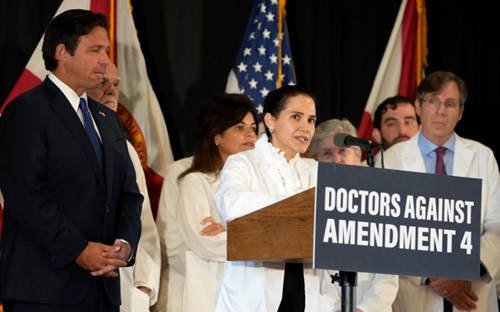Amendment 4, if approved by Florida voters, would have put the right to abortion in the state constitution. The constitution-changing referendum needed 60% to get approved, and it almost hit that number with 57% of Floridians supporting it.

"There's no question that the other side will try again in Florida," Scott Baker, of public affairs firm Cogency Strategic, tells AFN.
Cogency Strategic, which specializes in helping pro-life causes, went to work in Florida to stop Amendment 4. The organization collaborated with four groups – Keep Florida Pro-Life; Pro-Life Action Ministries; Action for Life; and the American Association of Pro-Life Obstetricians and Gynecologists – to launch and promote a “No on 4” digital campaign that ultimately, but barely, won on Election Day.
In the election last week, voters supported pro-abortion ballot initiatives in Arizona, Colorado, Florida, Maryland, Missouri, Montana, Nebraska, New York, Nevada, and South Dakota.
Similar abortion voters were rejected in only three states, Florida, Nebraska, and South Dakota.
 One lesson learned from the Florida fight, Baker shares, is that a targeted campaign is better than the “blanket approach” used in previous campaigns.
One lesson learned from the Florida fight, Baker shares, is that a targeted campaign is better than the “blanket approach” used in previous campaigns.
"Using these really strong, very specific micro targeting tactics to reach the right voters,” he advises, “is the way to move forward, and I think what we did with Florida verifies that."
Looking beyond the win in Florida, Baker says the pro-abortion side intends to "bring this fight to every state in the U.S."
Their strategy is simple, too, he adds, which is use ballot referendums to enshrine abortion in the state constitution.
Carol Tobias, who leads the National Right to Life Committee, tells AFN the pro-life side knows more ballot referendums are coming to other states. Voters in those states, she says, must be reached by pro-lifers with a winning message about saving a baby's life, and protecting the health and safety of the mother.

"We're going to have to come up with programs, and maybe advertising campaigns,” she advises, “to make sure that people realize just because it's legal doesn't mean it's the right thing to do."
Abortion is a money-making process, Baker says, and the abortion side has a lot of money to invest in pushing Florida's vote to 60% in a future election.
"So they'll be back in Florida," Baker warns. "So certainly there are lessons that we can learn here. We have a better understanding of what resonates with Floridians, what they really care about."







